The Year in Yale Law School Faculty Books
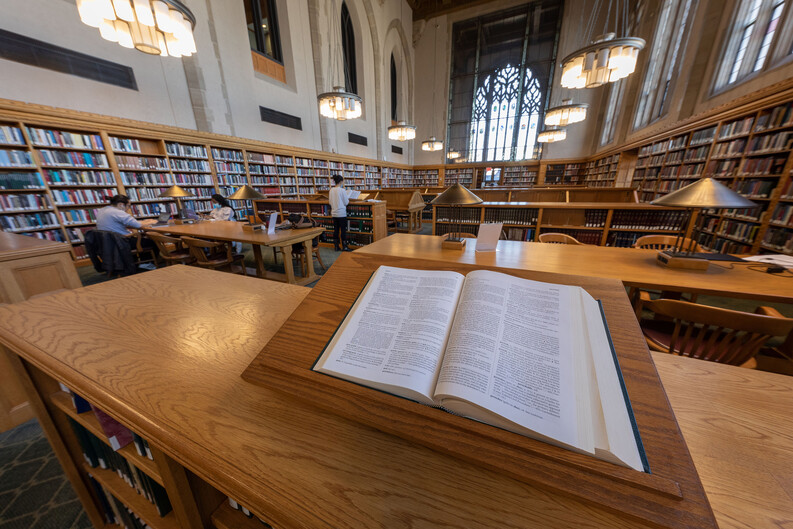
In 2023, Yale Law School faculty tackled complex issues from across the legal spectrum in new scholarship and books. In topics as wide-ranging as how to structure retirement programs to the ethics and history of hacking, from finding lessons on preserving democracy close to home to a new model for policing, the books below showcase the breadth and depth of scholarly inquiry that takes place among the Yale Law School faculty. Here’s a review of books by YLS faculty published in 2023.
Professor Ian Ayres, Retirement Guardrails: How Proactive Fiduciaries Can Improve Plan Outcomes
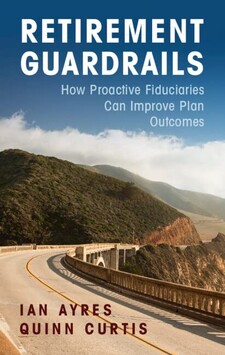
Yale Law School’s Ian Ayres ’86 and the University of Virginia’s Quinn Curtis ’09 argue that employers have the fiduciary duty to structure their retirement plans so that employees invest wisely. Though the law has long required that employers include only prudent options in plan menus, Ayres and Curtis make the legal case for proactively helping investors choose among them.
Ayres and Quinn argue that fiduciaries should learn whether employees are making menu mistakes. And fiduciaries should correct those mistakes by dropping funds where misuse is particularly prevalent or “guardrailing” those funds with soft or hard caps on how much can be invested.
Through guardrails, fiduciaries can “constrain but maintain choice,” thereby encouraging participants to invest prudently. Ayres and Curtis stress that menu construction is only a single, though crucial, means of reforming how people save for retirement. “[T]he struggle to improve retirement protections for Americans is far from over,” they write, “and this book is not the final word on policies that might aid in this struggle.”
Professor Aslı Ü. Bâli, Co-Editor, Federalism and Decentralization in the Contemporary Middle East and North Africa
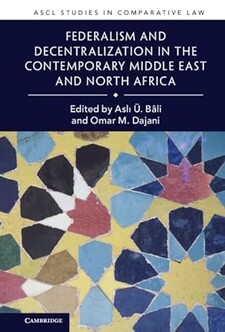
Professor of Law Aslı Ü. Bâli ’99 and co-editor Omar M. Dajani ’97 offer an in-depth look at the law and politics surrounding government reform in an area that has long struggled with identity conflict in Federalism and Decentralization in the Contemporary Middle East and North Africa (Cambridge University Press) – the first scholarly work in English to address decentralization in the region.
Decentralization can be broadly defined as the transfer of power from one central authority to several lower government entities. Through case studies and essays, Bâli and Dajani weave a textured portrait of decentralization in an area undergoing sweeping transition that until now had been underexamined in the comparative law and comparative politics literatures.
The volume aims to appeal to academics and policymakers alike by including leading scholars and policy analysts who are experts in constitutional law, conflict resolution, comparative politics, comparative law, political theory, sociology, and urban planning.
Professor Abbe Gluck, Co-Editor, COVID-19 and the Law: Disruption, Impact and Legacy
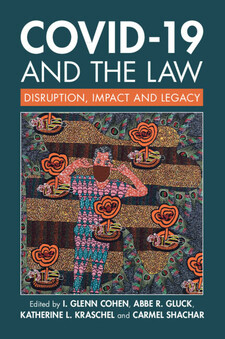
Comprising research by more than four dozen individual contributors, COVID-19 and the Law: Disruption, Impact and Legacy (Cambridge University Press) examines the wide-ranging implications of the COVID-19 pandemic on the law of health care and beyond. Edited by Alfred M. Rankin Professor of Law Abbe R. Gluck along with I. Glenn Cohen, Katherine Kraschel, and Carmel Shachar, the volume argues that the COVID-19 pandemic posed a “stress test” to public health systems worldwide and connects the legacy of the pandemic to the broader legal system.
Contributors trace how those systems both succeeded and failed in the pandemic’s wake. Each of the 25 chapters consider a distinct set of legal and policy changes that have emerged since 2020. They include matters of health equity and racial justice, the prison system, reproductive rights, administrative law, constitutional and election law, and federal benefits programs.
From 2020 to 2021, Gluck served in the Biden administration as Special Counsel to the President. In that capacity, Gluck was the lead lawyer for the White House COVID-19 Response, first for the Biden-Harris Transition and then in the White House as Special Counsel to the White House COVID-19 Response Team.
Yale Law School faculty members Clinical Professor of Law Marisol Orihuela ’08 and Arthur Liman Professor of Law Judith Resnik collaborated on a chapter titled “Tolerating the Harms of Detention, With and Without COVID-19” with Jaimie Meyer, Associate Professor of Medicine and Public Health at Yale.
Professor Robert Gordon, Co-Editor, The American Law Institute: A Centennial History
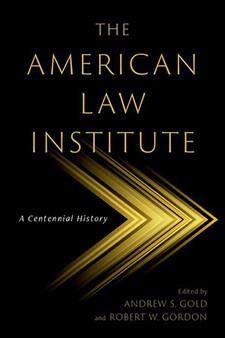
Chancellor Kent Professor Emeritus of Law and Legal History Robert W. Gordon and Brooklyn Law School’s Andrew Gold trace 100 years of pivotal moments in the history of the American Law Institute in their new co-edited volume.
The American Law Institute: A Centennial History (Oxford University Press) traces how the ALI, one of the most important legal institutions in the United States, continues to pursue its original mission of reducing complexity and promoting uniformity in American law.
ALI held its first Annual Meeting in February 1923, and early leaders included William Howard Taft, Charles Evans Hughes, Learned Hand, and Benjamin Cardozo. Gordon and Gold describe the ALI as an enduring movement for legal reform, exemplary not only for its influence, but also its longevity.
Since its founding, the ALI has been dedicated to making American law clearer and more modern. The Institute publishes three kinds of projects, which are known as Restatements, Principles, and Codes. Each serves as an authoritative reference for courts, legislatures, and other audiences. The ALI brings projects for a vote before its elected members, who comprise leading lawyers, judges, and legal scholars. The Institute is widely known for its culture of robust exchange and democratic discourse.
In addition to Gordon, the volume’s contributors include Anne Urowsky Professor of Law Douglas NeJaime and Florence Rogatz Visiting Professor of Law Richard Brooks.
Norman Silber, Outside In: The Oral History of Guido Calabresi
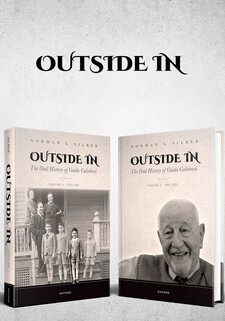
For more than six decades, Sterling Professor Emeritus of Law and former Dean Guido Calabresi ’58 has been a pillar of Yale Law School. Senior Research Scholar Norman Silber’s two-volume set Outside In: The Oral History of Guido Calabresi (Oxford University Press), recounts Calabresi’s formative years and chronicles his extraordinary career as a teacher, dean, and jurist.
Calabresi led the Law School as Dean from 1985 until 1994, when he was named to the U.S. Court of Appeals for the 2nd Circuit by President Bill Clinton ’73. He has authored seven books and more than 100 articles. A legendary professor and a co-founder of the field of law and economics, Calabresi ranks among the most influential legal scholars of his time.
Calabresi, Silber writes, is “a man who, for much of his life of high accomplishment, has nonetheless identified himself as an outsider.” Outside In details the antisemitism and anti-Italian prejudice that Calabresi faced upon arriving in New Haven with his family after their escape from fascist Italy in 1939. He illuminates Calabresi’s lifelong commitment to fighting for and upholding civil rights, as well as his participation in social and legal debates that gripped the nation.
The book also covers Calabresi’s indelible impact on Yale Law School, the place that shaped him as a lawyer and that he in turn would shape. Among other pivotal changes as dean, Calabresi secured the Law School’s financial independence and modernized its facilities.
Part oral history and part biography, Outside In is the culmination of Yale Law School’s Guido Calabresi Oral History Project, which began in 2010. Silber interviewed Calabresi on more than 100 occasions and spoke with dozens of colleagues. The transcribed and edited recollections are accompanied by Silber’s critical commentary, which adds historical and social context.
Professor Paul Kahn, Democracy in Our America: Can We Still Govern Ourselves?
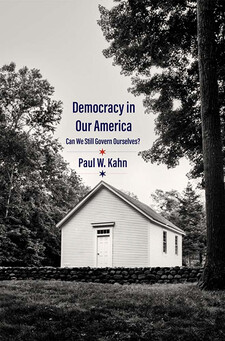
In his newest book, Democracy in Our America: Can We Still Govern Ourselves? (Yale University Press), Robert W. Winner Professor of Law and the Humanities Paul W. Kahn ’80 argues that the key to understanding and preserving American democracy lies close at hand. To make his argument, Kahn examines how changes in our national social, cultural, and political lives have affected Killingworth, Connecticut, the town he has called home for the past 25 years.
Kahn, whose past work often focused on more abstract questions of political and legal theory, explains his turn to the local in the aftermath of the election of Donald Trump. “The lesson of 2016 to scholars was ‘get real,’” Kahn writes. “I take that lesson to heart by staying close to the political practices and beliefs of the local community that I know best.”
Informed by his experience in Killingworth, Kahn formulates a political theory that puts volunteering, not voting, at the foundation of self-government. Civic participation, Kahn argues, makes self-governance possible.
Kahn warns that volunteerism faces “existential threats” in Killingworth and across the nation. He examines how changes in civil society, family, and work life, as well as in forms of communication have made it increasingly difficult for citizens to take part in their community’s collective life. Looking forward, Kahn considers some possibilities by which communities can try to restore an “ethos of public service.”
Professor Samuel Moyn, Liberalism Against Itself: Cold War Intellectuals and the Making of Our Times

In his latest book, Chancellor Kent Professor of Law and History Samuel Moyn looks back at an influential group of liberal intellectuals of the last century and finds in their work where, in his view, today’s liberals go wrong.
Liberalism Against Itself: Cold War Intellectuals and the Making of Our Times (Yale University Press) recounts how a group that included political theorists, philosophers, and others remade liberalism in the postwar years. Moyn shows how these thinkers — Isaiah Berlin, Gertrude Himmelfarb, Karl Popper, Judith Shklar, Lionel Trilling and those in their orbit — redefined their movement’s ideals. However, Moyn argues, the ideas they put forth hardly helped their cause.
“Cold War liberalism was a catastrophe — for liberalism,” Moyn declares at the start of the book.
Moyn shows how the theories of the Cold War liberals have had remarkable staying power — in his view, to the detriment of liberalism. He describes how ideas developed in the 1940s and 50s were molded to fit the Vietnam War, the civil rights era, 9/11, and the Trump years. Moyn is critical of these many attempts to rehabilitate Cold War liberalism, finding the philosophy ill-suited to address each new threat to democracy. By continually resuscitating the same form of liberalism, he argues, liberals keep missing the opportunity to come up with something better.
“The endless revival of its Cold War version has been a means of avoiding the only hope for liberalism, which is to reinvent it beyond the terms we have known,” he writes.
Professor David Schleicher, In a Bad State: Responding to State and Local Budget Crises
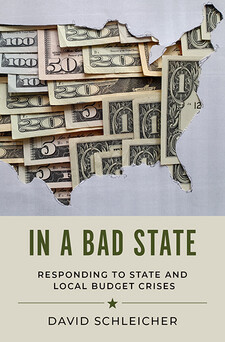
In In a Bad State: Responding to State and Local Budget Crises (Oxford University Press), Professor of Law David N. Schleicher gives federal policymakers “a practical guide” for when states and cities cannot pay their debts. Schleicher uses economics, political science, law, and history to explain what the federal government can — and cannot — do to provide for the general welfare during state and local defaults.
In a Bad State begins with what Schleicher calls a “trilemma.” No matter what the federal government does when a state or city faces a default crisis, he writes, it runs three risks: the economic turmoil that results from austerity measures; the moral hazard of state and local officials taking bailouts for granted; and the likelihood that lenders will not support municipal infrastructure if there is a default. “At best,” Schleicher concludes, “the federal government can prevent two of them. It has to pick its preferred poison.”
In a Bad State seeks to rectify long-standing shortcomings in the literature about budget crises at all levels of government. “Scholarship and elite discussion around these issues,” Schleicher writes, have ignored “many of the real concerns created by state and local fiscal distress.” Schleicher draws on his expertise in the field of local government to unravel the tradeoffs that shape state budgeting — and lead to its failure.
Professor Scott Shapiro, Fancy Bear Goes Phishing: The Dark History of the Information Age, in Five Extraordinary Hacks
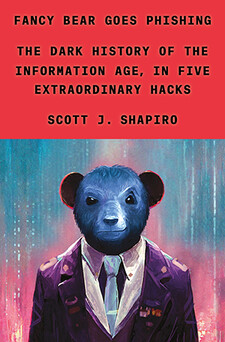
In his book, Fancy Bear Goes Phishing: The Dark History of the Information Age, in Five Extraordinary Hacks (Farrar, Straus and Giroux), Professor Scott J. Shapiro ’90 traces the very human history behind hacking. Shapiro, Charles F. Southmayd Professor of Law and Professor of Philosophy at Yale Law School, argues that psychological and social forces shape cybercrime and cyberwarfare, threats that are much-feared but rarely, if ever, understood.
Fancy Bear Goes Phishing brought Shapiro back to his earliest passion: computer programming. In the introduction, Shapiro recounts the first time a classmate in ninth grade biology showed him how to use a computer. “I was obsessed with computer programming for the next decade,” he recalls. To understand the technical dimensions of his subject, Shapiro taught himself how to hack.
“Given my extensive technical background in computer science, I figured it wouldn’t take me long to get up to speed,” he writes. “But I was wrong. So wrong.”
Shapiro’s research led him to memorize coding languages, audit a graduate-level seminar on operating systems, and frequent hacking conventions. In the process, he devised a cutting-edge course about lawyering in the information age.
Shapiro hopes to equip future lawyers and policymakers with the technical knowledge required to regulate the digital realm. While he does not minimize the harm done by hacking, Shapiro finds widespread alarmism to be unfounded.
Professor Tom Tyler and Caroline Nobo, Legitimacy-Based Policing and the Promotion of Community Vitality
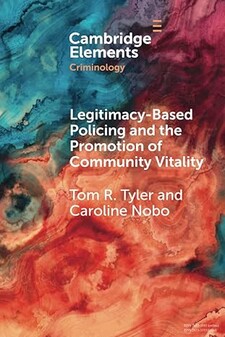
In their monograph, Tom Tyler and Caroline Nobo of The Justice Collaboratory at Yale Law School propose legitimacy-based policing as a new model to combat crime and build trust between police and the communities they serve. Tyler and Nobo demonstrate how police can move beyond the “coercive model of crime control” that has predominated in the United States for decades.
In Legitimacy-Based Policing and the Promotion of Community Vitality (Cambridge University Press), Tyler and Nobo contend that legitimacy, rather than use of force, determines whether members of a given community will comply and cooperate with police. Reviewing the scholarly literature, Tyler and Nobo explain that people “authorize” authorities they believe to be legitimate.
Citing empirical scholarship, the authors show that legitimacy-based policing counters crime at least as effectively as coercive and carceral approaches to policing. And they argue that legitimacy confers another significant benefit: fostering economic development and communal vitality. If structures of authority are to meet the needs of communities, Tyler and Nobo conclude, policing must seek legitimacy from those it purports to serve.
Professor Taisu Zhang, The Ideological Foundations of Qing Taxation: Belief Systems, Politics, and Institutions
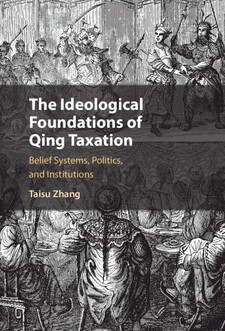
Professor of Law Taisu Zhang ’08 addresses “perhaps the central question in modern Chinese history” in his book The Ideological Foundations of Qing Taxation: Belief Systems, Politics, and Institutions (Cambridge University Press): why did China enter the 20th century weaker than Japan and Europe? Zhang’s book, the second volume of a planned trilogy, argues that the beliefs held by policymakers played a critical role.
Zhang traces how a philosophy that paired Confucian ethics with realist concerns shaped 268 years of Qing taxation policy from 1644 to 1912— and left China without the military or financial means that would propel its counterparts to dominance.
A lawyer and comparative legal and economic historian, Zhang draws upon ideology as an analytical lens. Rather than depict early modern China with broad brushstrokes, Zhang unearths the “political and intellectual idiosyncrasies” that characterized Qing rule. He situates ideology as one historical force that interacted with others, including class structure and market volatility.
Zhang raises profound questions about the interplay of ideology, culture, and law. Zhang notes that ideology is both empirical and normative — “how” someone implements an ideology may differ from “what” that ideology entails. By describing the Qing taxation system as ideological in nature, Zhang does not pass judgment on whether his subjects were “right” or “wrong.” Rather, his work examines how doctrine molds legal history, particularly as it pertains to China’s emergence into the modern era.


